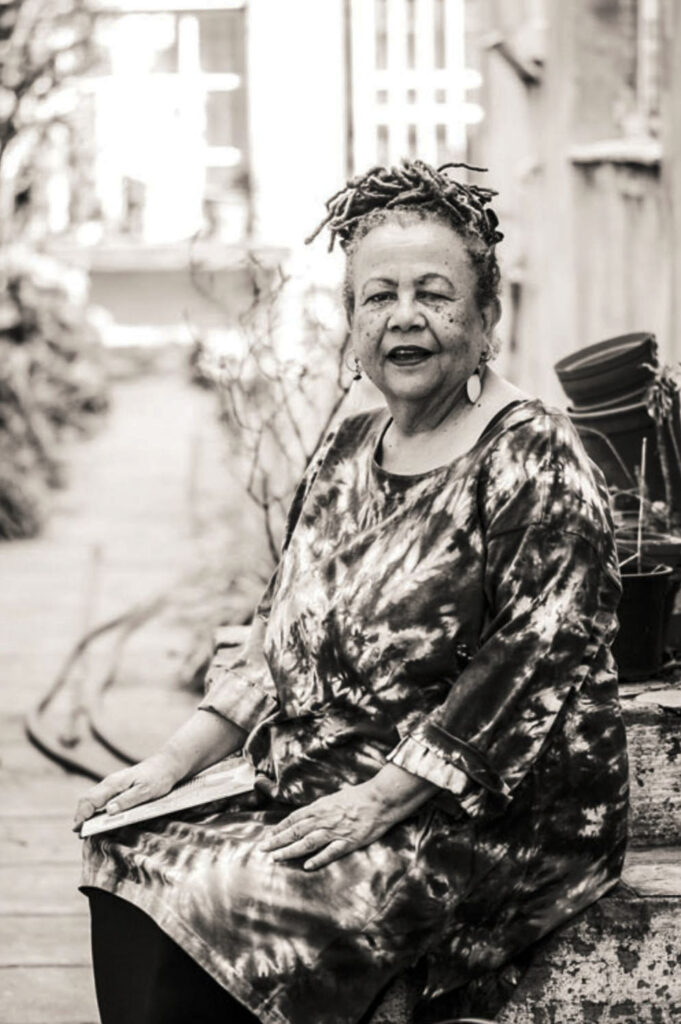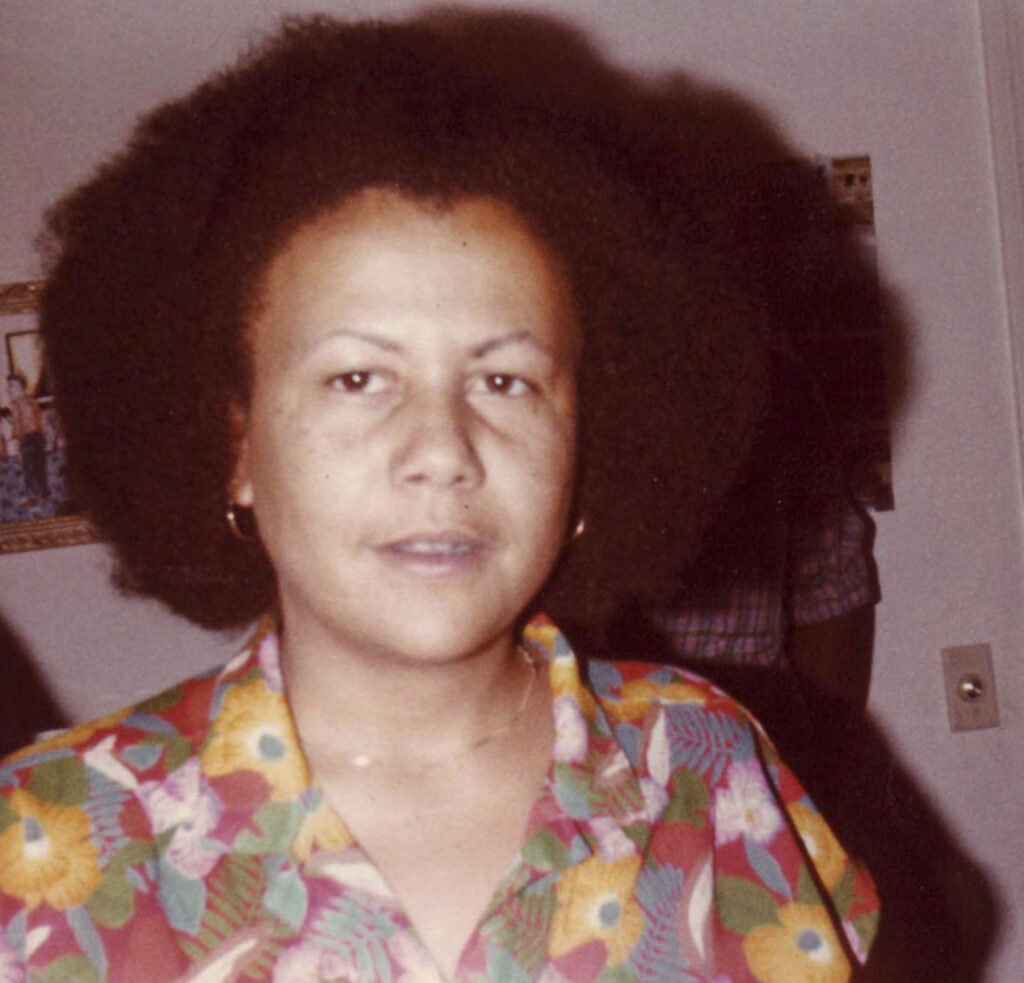‘Take me for a ride’: Myesha Jenkins’s instrument was the word, and she played an important role in claiming the stage for women poets. Photos: myeshajenkins.com
OBITUARY
Myesha Jenkins (1948 – 2020)
Poet, feminist cultural activist and jazzwomxn Myesha Jenkins died on Saturday, September 5. San Francisco-born Jenkins had lived in Johannesburg since she moved here from California in 1993. She was not just an observer but an integral part of our jazz scene: her instrument, rather than some machine-made construct of metal, valves and reeds, was the word.
The sounds of playing, the players and the particularity of the South African scene were all magicked into life from type on a flat page through her words, as in this vignette, Jazz Club, of the elders of the genre:
 Myesha Jenkins was vital to a movement of women who stormed the stage on their own terms
Myesha Jenkins was vital to a movement of women who stormed the stage on their own terms“On Sunday afternoons/ Old men sit under a tree/ Listening to their music/ Laughing loudly/ Sipping brandy and coke/ Tapping their two-toned shoes/ Remembering dreams of/ Red dresses and flying brown legs.”
“Magicked”, though, is the wrong word: like every good writer, Jenkins worked damn hard at her craft. Having been writing for years, she found in South Africa the supportive company of other poets.
With two others she met at a 2002 Port Elizabeth writers’ workshop, Napo Masheane and Ntsiki Mazwai, she formed the Feelah Sistah Collective.
“Men so dominated that space,” she said, “that when we got home we said: ‘We have to do something about this.’ We phoned around again and again to get others to join us. Lebo [Mashile] was the one who turned up.” Feelah Sistah became a trio, regularly augmented by the most interesting of other poetic guests.
The mission of Feelah Sistah was the same one that Jenkins lived on other stages and in other arenas too: “We want to claim a stage where women who are poets can speak to and move other men and women. We’re tired of ‘… and now the ladies are gonna come up’ — as though we are different to other poets,” she said at the time.
Her love of jazz had started early. “I’ve been a lover of jazz for over 50 years,” she wrote in 2017. “It started in college and saw me through my studies, marriage, divorce, travel and relocation halfway around the world. I was a waitress at a jazz club for several years, which gave me repeated exposure to the different varieties of that music as well as the men (mostly) and women who make it. It was urban Black classical music that reflected migration, urbanisation, anger, resistance, freedom. That was jazz to me.”
 Myesha Jenkins’s love for jazz saw her through college, relocation, and remained a key driver of her creativity
Myesha Jenkins’s love for jazz saw her through college, relocation, and remained a key driver of her creativity
Resistance to racism, oppression, ageism and misogyny infused Jenkins’s texts and the praxis of her life. Sometimes it was a subtle undertext; the freedom of jazz metonymic for greater freedoms; sometimes front and centre, as in In The Night:
“Women are out in the night.
They are cleaning streets/ some are walking streets/ coming home from work/ others are working/ answering a call/ rushing to the hospital/to bail someone out of jail/ getting the forgotten loaf of bread/ running from here to there/ going to hang with the girls/ enjoying the freedom of the club/ relaxing from a hard day/ of taking orders/ sunny-side up by tomorrow in stilettos/ dressed to kill with glistening lips/ looking for kissers.
And some are just alone again in the dark/ actually enjoying the moon.
What are you doing out so late, ma?/ Being a woman, officer,/ being a woman.”
Jenkins published two collections of her own work, Breaking the Surface in 2005 and Dreams of Flight in 2011, and also featured in various anthologies. In 2017, she united her passions for jazz and writing as the shaping spirit behind the collection To Breathe Into Another Voice, an anthology of South African jazz poetry.
In 2013, Jenkins was awarded the Mbokodo Award for womxn in arts in the poetry category.
She brought poetry to the airwaves between 2011 and 2016 through the annual SAfm Women’s Month series Poetry in the Air, and more recently, even while struggling with the debilitating effects of cancer treatment, in the Kaya FM podcast series Myesha’s Memoirs, Living with Jazz and Poetry. She brought poetry to the live stage through the monthly Out There jazz and poetry sessions she hosted at the Orbit Jazz Club.
And she brought poetry into countless classrooms and workshops, including through her work with visual artists on the Arts for Humanity project. Having seen her teach, her “playing with words” teaching approach was unique and uniquely effective, meriting far wider recognition. In just an hour, she got a roomful of hesitant womxn juggling language with freedom and delight.
Again, it was serious magic: she worked hard to make sure her teaching served the collective of learners and worked equally hard to shape spaces in which new poets could speak and create.
When we get back to the jazz clubs again, it will be impossible not to see that empty seat, close to the stage, where Jenkins ought to be — listening intently, head tilted, half-smiling, eyes closed; sometimes, when the spirit of the sounds moved her, boubou-clad shoulders dancing.
“You can take me for a ride/anytime, day or night/ let’s get out of here/ ride into the heavens./ We’re bumping across the mountains of the moon/ passing planets where the oxygen is thin/ gliding onto Saturn’s rings/ listening to the tinkle of twinkling stars./ Yeah, take me for a ride/ across galaxies/ into another universe/ discovering a new sky/surrounded by nothing we’ve ever known/ clear open road./ Yeah, take me for a ride.”
This article was first published on sisgwenjazz.wordpress.com.